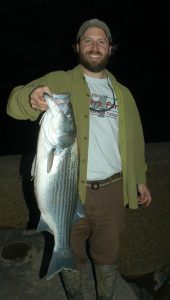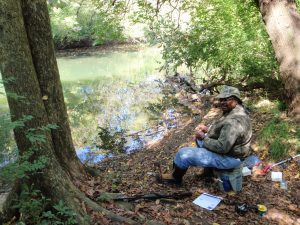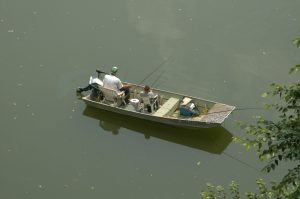Adventures of Hope:
A Black Warrior Riverkeeper Intern’s Fishing Surveys
 Water is the most basic yet most necessary part of our lives. The Earth is made up of 71 percent water, and our own bodies contain a similar percentage. Approximately one million people throughout parts of 17 Alabama counties obtain their drinking water from the Black Warrior River watershed, which supplies water to many of our local breweries as well. A wide variety of pollution sources continually threaten the Black Warrior watershed’s ability to provide clean drinking water, not to mention recreational opportunities and wildlife habitat.
Water is the most basic yet most necessary part of our lives. The Earth is made up of 71 percent water, and our own bodies contain a similar percentage. Approximately one million people throughout parts of 17 Alabama counties obtain their drinking water from the Black Warrior River watershed, which supplies water to many of our local breweries as well. A wide variety of pollution sources continually threaten the Black Warrior watershed’s ability to provide clean drinking water, not to mention recreational opportunities and wildlife habitat.
 Black Warrior Riverkeeper works toward ensuring clean water throughout the entire Black Warrior watershed every day. We monitor water pollution in a variety of ways. Our Riverkeeper Patrol Program is helpful in identifying pollution throughout the watershed and promoting solutions. Riverkeeper Nelson Brooke conducts river patrols to spot pollution from an eye level. Unfortunately, we can’t always identify pollution from the ground. But, thanks to our partners at SouthWings, an aviation conservation organization, we can also identify pollution from up in the air. SouthWings provides flights to non-profit organizations to showcase the environmental challenges in the Southeast from a unique perspective.
Black Warrior Riverkeeper works toward ensuring clean water throughout the entire Black Warrior watershed every day. We monitor water pollution in a variety of ways. Our Riverkeeper Patrol Program is helpful in identifying pollution throughout the watershed and promoting solutions. Riverkeeper Nelson Brooke conducts river patrols to spot pollution from an eye level. Unfortunately, we can’t always identify pollution from the ground. But, thanks to our partners at SouthWings, an aviation conservation organization, we can also identify pollution from up in the air. SouthWings provides flights to non-profit organizations to showcase the environmental challenges in the Southeast from a unique perspective.
Another way we spot pollution is by speaking to people who directly rely on the river. This summer, our Black Warrior Riverkeeper interns have conducted creel surveys with fishermen to learn about their fishing habits in several locations throughout the Black Warrior watershed.
 The purpose of conducting these creel surveys is to inform fishermen about fish consumption advisories, find out what they catch, ask if they’ve seen any pollution problems in the area, and let them know that Black Warrior Riverkeeper can help.
The purpose of conducting these creel surveys is to inform fishermen about fish consumption advisories, find out what they catch, ask if they’ve seen any pollution problems in the area, and let them know that Black Warrior Riverkeeper can help.
By speaking with fishermen directly, we gain an understanding of their awareness of fishing advisories around them. We also educate those who don’t know about the consumption advisories for certain species. In Lake Tuscaloosa, Smith Lake, and Inland Lake, popular fishing spots in our watershed, fish advisories identify contaminants like Mercury.
We always advise fishermen in these areas to use caution when feeding certain species of fish to women and small children. We also provide them with a map to show the specific areas of consumption advisories, and let them know about the FISH GUIDE program that our fellow Waterkeepers at Coosa Riverkeeper launched for the state of Alabama. Finally, we tell them how to report pollution to us.
 By monitoring pollution throughout the watershed, Black Warrior Riverkeeper strives to provide a better quality of life to those who live in it. Conducting creel surveys is a unique way for our interns to meet people who see the direct effects of pollution on their outdoor recreation and, if they keep their catch, their family meals. We are putting a face to our name for those who have only heard of us, and getting the word out to others that we can all do our part to monitor pollution.
By monitoring pollution throughout the watershed, Black Warrior Riverkeeper strives to provide a better quality of life to those who live in it. Conducting creel surveys is a unique way for our interns to meet people who see the direct effects of pollution on their outdoor recreation and, if they keep their catch, their family meals. We are putting a face to our name for those who have only heard of us, and getting the word out to others that we can all do our part to monitor pollution.
Outdoor recreation is a multi-billion dollar industry for the state of Alabama, and fishing is a great Southern tradition. With the help of our members and folks who rely on the river, particularly fishermen, we hope to keep fishing as fun and safe as it can and should be.
Author Hope Runyan, a senior at The University of Alabama, has received a grant from the Curtis and Edith Munson Foundation to work with Black Warrior Riverkeeper. Runyan, a senior majoring in public relations, works for the organization as a communications intern throughout the summer. The grant, provided by a partnership between the Munson Foundation and The University of Alabama’s Department of Advertising and Public Relations, is the highest award given to a student in the College of Communication and Information Sciences. Read about all of Hope’s internship adventures here: blackwarriorriver.org/adventures-of-hope












